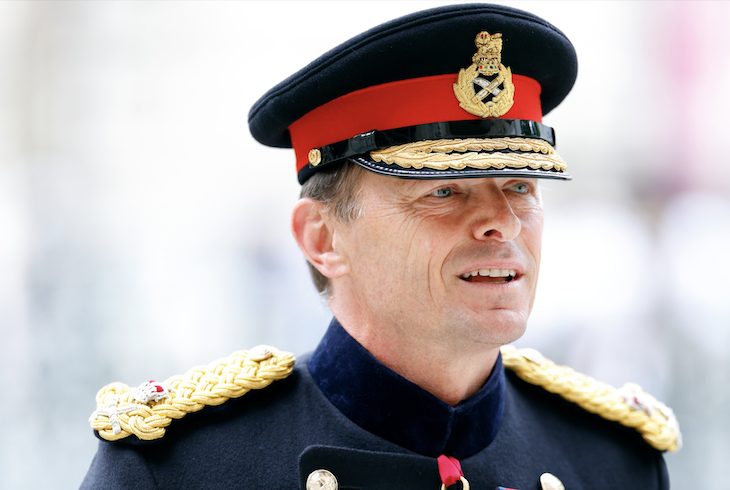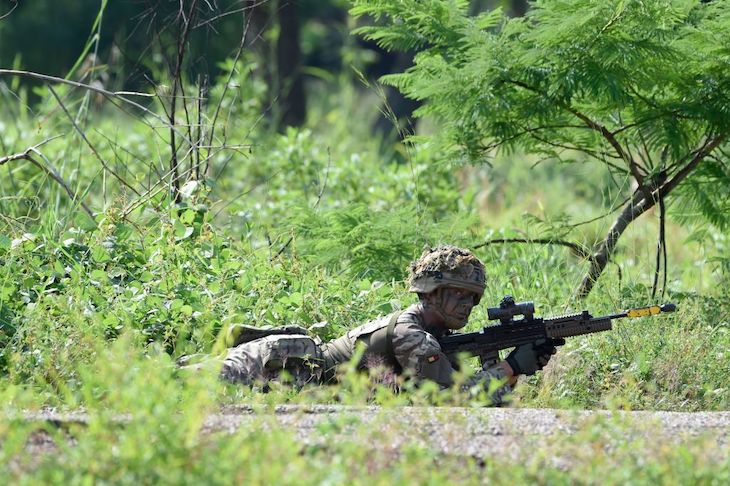Old soldiers never die, the song goes, they just fade away. Next year, General Sir Patrick Sanders, Chief of the General Staff and the professional head of the British Army, will step down after less than two years in post. He is 57, and will have served for 40 years. But he is not fading away; rather he leaves under a muted storm, having clashed with the Chief of the Defence Staff, Admiral Sir Tony Radakin, and after vainly resisting cuts to the size of the Army. Under current plans, our land forces will shrink to 73,500 by 2025. We have not fielded so few soldiers since 1799.
It is widely believed – and the government has done nothing to deny – that Sanders’ successor has already been chosen. Lieutenant General Sir Roland Walker is currently Deputy Chief of the Defence Staff, with direct responsibility for military operations and for advising the government on military strategy. He is a savvy Whitehall warrior: he had shared a Portakabin with Ben Wallace, the previous defence secretary, when they were young Guards officers in County Tyrone, Northern Ireland in the 1990s, and impressed his old comrade-in-arms as Director Special Forces when Wallace was security minister. Walker has also made a good impression on the Prime Minister.
A US general told Ben Wallace privately that his colleagues no longer considered our Army a top-tier fighting force. That stung
Roly Walker is a popular officer whose presumed appointment has been welcomed by the defence community. He has substantial experience of active service, and cheated death in 2010 when he was commanding the Grenadier Guards in Afghanistan. His Ridgback armoured vehicle was blown up by an improvised explosive device and thrown six feet into the air, its wheels blown off. He and the other five soldiers inside were shaken but unharmed; ‘it’s a pretty unnerving experience’, he commented afterwards. Walker was later awarded the Distinguished Service Order for his leadership.
Sensibly, he has realised that the reduction in size of the Army is a done deal, a political decision above his pay grade, however much, and however correctly, Sanders has criticised it. At 53, he has time to serve a standard three- or four-year term as CGS and will still be in contention to become Chief of the Defence Staff after Radakin or his successor, so he has the opportunity to shape the Army in profound ways.

There is an enduring criticism, most mordantly expressed recently by Simon Akam, briefly a cavalry subaltern, in his 2021 book The Changing of the Guard, that the army is an organisation riddled with social class distinctions. Half of the officer cadets who attend the Royal Military Academy Sandhurst come from fee-paying schools, and Akam’s own regiment, the Royal Scots Dragoon Guards, did not accept its first state-educated officer until 2003 (it can trace its lineage back to 1678).
Walker is not an obvious antidote to this. He was educated at Harrow and sponsored by the Army to attend the Royal Agricultural College Cirencester, famed for well-bred gilet-wearing heirs to large estates. He is not alone: the last Chief of the General Staff not from a fee-paying school was Lord Harding of Petherton, who retired in 1955. And while Gavin Williamson introduced a Diversity Plan during his time as defence secretary, the preponderance of independent schools is, if anything, growing.
More pertinent still is Walker’s professional background. From 1997 to 2008, he served with the Special Air Service, and was Director Special Forces from 2018 to 2021. The UK Special Forces are very highly regarded, and the creation of the four-battalion Ranger Regiment in 2021 will enhance the Army’s special operations capability, but there are concerns that these glamorous units are growing at the expense of the regular infantry, where any army’s core strength still lies.
Walker will take command when there is an unspoken existential question confronting the Army. What is it for? The Ministry of Defence currently aims to be able to field a war-fighting division of around 10,000 personnel, but, while it retains division-level command and control, it is unlikely that 3rd (UK) Division could be deployed as a stand-alone force in any useful time frame. It is underequipped, new armoured vehicles are delayed and deficient, and it is not even certain that it could overmatch a ‘peer opponent’ (MoD euphemism for Russia). Earlier this year, a US general told Ben Wallace privately that his colleagues no longer considered our Army a top-tier fighting force. That stung.
Experience in irregular warfare runs deep. One Army source told the Times that Walker is ‘a special forces man who believes the army should be converted into small bands of determined men’. There is a radical school of thought that this is the way ahead for our armed forces: we are likely to fight as part of a coalition in the future, so why not be the sharpened tip of the US spear? It plays to our strengths. But it is not a decision we should make by default. The Army cannot get smaller, so do we keep struggling to be a full-spectrum fighting force, or do we specialise, like many small nations do? Roly Walker may have a large part to play in forcing that decision.







Comments